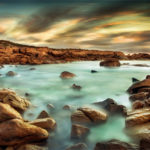A color chart is a tool that’s easy to underestimate. It’s not nearly as complex as most of the gear photographers keep on hand. In fact, more often than not, a color chart is little more than a plastic card adorned with Pantone swatches. For this reason, many photographers are shocked to learn just how much the humble color chart can improve a photograph or video clip. Jay P Morgan explains here just how this portable palette can be of use in the studio and in the field alike:
Using the Datacolor Spydercheckr to demonstrate, Morgan proves just how easy it is to implement the power of a color chart. A model holding the palette at the start of a shoot can save hours of color correction editing during post processing. With the eyedropper tool in Adobe Bridge or Lightroom, you can select the patch closest to 18 percent gray and instantaneously see results.
When applying this action, you’re directing the software to recognize that particular color as gray and adjust the overall color of the image so that the swatch actually appears perfectly gray. Once you have the color adjustments figured out for one photograph in a series, it’s possible to apply the same adjustments throughout all photographs taken within the same setting and lighting scenario.
You may be wondering what the necessity of color correction is if your camera settings are synced to the color temperature of the lights being implemented on a shoot. The fact of the matter is that surrounding objects inside and outside of a scene give off ambient light. Though it may not be immediately obvious to the untrained eye, these objects can cast color tints that can affect the entire shot. The only way of guaranteeing perfect color—regardless of surrounding elements—is to use a color checker on set.
The best part? Presets can be applied right away to correct color, allowing tethered photographs to automatically receive color correction adjustments as they’re imported into a laptop or computer. Conveniently, the color chart is available in a number of sizes and is durable enough to be slipped into a camera bag without a second thought.
Of course, once you have the correct tones in place, you can adjust shadows, highlights, and tonal filters by hand to your liking. After all, color is a nuanced science without a right or wrong. However, knowing how to set a scene to appear as it would to the human eye is a fundamental piece of information that can help many photographers come closer to creating the images they strive for.
Like This Article?
Don't Miss The Next One!
Join over 100,000 photographers of all experience levels who receive our free photography tips and articles to stay current:







With my camera, I can set colour correction in a particular function by taking a picture of something that’s white. That makes subsequent colour correction much easier.